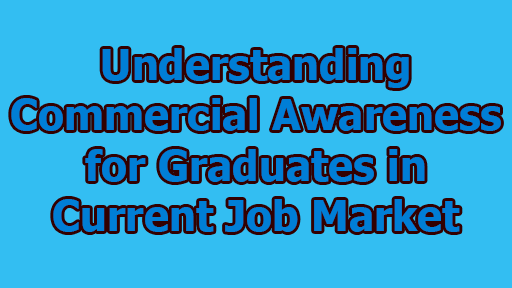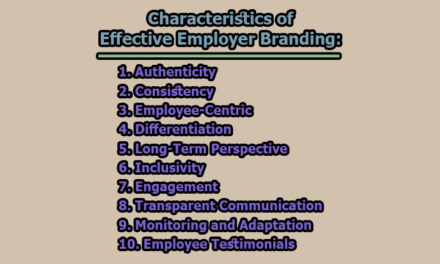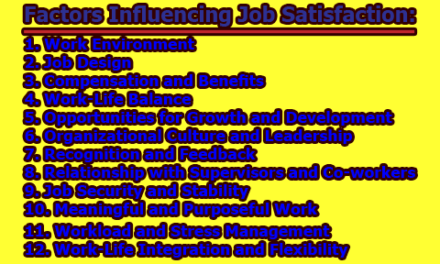Understanding Commercial Awareness for Graduates in Current Job Market:
In the competitive world of today’s job market, employers across various industries seek candidates with strong commercial awareness. It is a coveted quality that reflects a candidate’s understanding of how economic and political factors can influence their chosen industry and potential employers. Commercial awareness is not just a skill; it is a way of thinking that demonstrates a candidate’s ability to grasp the bigger picture and make informed decisions that benefit the organization. In this article, we will delve into the understanding of commercial awareness for graduates in current job market, its significance, and how graduates can develop and showcase this essential trait.
Defining Commercial Awareness:
Commercial awareness goes by several names in job advertisements, such as commercial acumen, commercial sense, commercial understanding, or having a commercial attitude. It can also be expressed as having a big-picture focus or being business-minded. A clear indication of an employer’s value for commercial awareness is often found in job adverts that emphasize being “customer-oriented.”
Importance of Commercial Awareness:
Commercial awareness is highly valued by employers as it reflects a candidate’s potential to contribute positively to the organization. Graduates with strong commercial awareness are better equipped to make strategic decisions, adapt to market changes, and identify opportunities for growth. This trait demonstrates proactive thinking, analytical skills, and a keen interest in the industry, all of which are invaluable qualities in today’s dynamic business landscape.
Essential Elements of Commercial Awareness:
Commercial awareness is a multi-faceted trait that encompasses a range of essential elements. Graduates who possess a strong commercial awareness are not only well-informed about their potential employers and industries but also demonstrate an ability to analyze and understand the broader economic and political context that influences business decisions. Let’s delve into the essential elements of commercial awareness:
1. Understanding of the Business: A fundamental aspect of commercial awareness is a comprehensive understanding of the organization and its operations. Candidates must be aware of the company’s products or services, its target market, and its overall business model. This knowledge indicates genuine interest and commitment to the organization, which is highly valued by employers.
Moreover, a candidate who grasps the company’s management structure and hierarchy can better align their career goals and aspirations with the organization’s growth and opportunities. By understanding the company’s goals and objectives, graduates can position themselves as potential assets that contribute to the company’s success.
2. Awareness of the Marketplace: Commercial awareness extends beyond knowing the company itself; it involves an awareness of the competitive landscape and the market dynamics in which the company operates. Candidates should be familiar with major competitors and their market positioning. They should be able to identify the unique selling points of the employer, differentiating it from other players in the industry.
Being well-informed about the factors that influence clients’ decision-making and purchasing behavior is crucial. Candidates who understand the market demand and consumer preferences can contribute valuable insights to the organization’s strategies and business development.
3. Knowledge of Industry Players and Trends: A standout candidate demonstrates an interest in the industry’s latest developments and stays updated on the actions and successes of major players. Being aware of which companies are securing significant contracts, entering strategic partnerships, or experiencing growth can provide valuable context during interviews and discussions with potential employers.
Keeping track of industry trends and emerging technologies can signal to employers that a candidate is forward-thinking and capable of adapting to changes in the market. It also showcases a proactive attitude toward professional growth and development.
4. Understanding of Past and Cyclical Trends: A well-rounded commercial awareness includes an appreciation of historical patterns and how they impact the industry cyclically. Graduates who can analyze historical data to predict future trends show a deeper level of insight. This understanding can help the organization make informed decisions in times of economic fluctuations or industry shifts.
For instance, knowing how economic downturns have historically affected the industry and the organization’s past responses to such challenges can help candidates propose strategic solutions to potential employers.
5. Grasping the Impact of their Role on Business Performance: Commercial awareness goes beyond a theoretical understanding of the industry; it involves a grasp of how one’s role as a graduate employee can directly influence the business’s performance. Employers value candidates who can make connections between their daily responsibilities and the company’s bottom line.
Candidates should be able to identify the implications of their decisions on profitability, customer satisfaction, or operational efficiency. This ability showcases a business-oriented mindset and a commitment to contributing to the company’s success.
Improving Commercial Awareness:
Improving commercial awareness is a continuous process that involves proactive research, staying informed about industry trends, and gaining practical experience. Graduates who actively develop their commercial awareness not only enhance their employability but also demonstrate their potential to make informed and strategic decisions in the workplace. Here are some steps to improve commercial awareness:
a. Industry Research: To build commercial awareness, graduates should conduct thorough research about their chosen industry. This includes staying up-to-date with the latest news, developments, and innovations. Subscribing to industry-specific newsletters, setting up email alerts on relevant search terms, and following reputable news sources and social media accounts can provide valuable insights.
b. Read Business Publications: Reading business publications like The Economist, Financial Times, Forbes, and industry-specific magazines helps graduates gain a broader understanding of the global economic landscape and specific industry trends. These publications often provide in-depth analysis, expert opinions, and market forecasts that contribute to a well-rounded commercial awareness.
c. Attend Seminars and Webinars: Participating in industry seminars, conferences, and webinars offers opportunities to learn from experts, network with professionals, and gain insights into emerging trends and challenges. Many of these events provide valuable discussions on market dynamics, consumer behavior, and business strategies.
d. Utilize University Resources: Students and recent graduates can leverage their university’s resources to enhance their commercial awareness. University libraries and career services often provide access to academic journals, industry databases, and business-related publications. These resources can significantly enrich one’s understanding of the business world.
e. Seek Work Experience: Internships, part-time jobs, or volunteer opportunities in relevant industries provide practical exposure to real-world business scenarios. Hands-on experience enables graduates to observe commercial and resource decisions being made and learn how organizations respond to market changes and challenges.
f. Analyze Case Studies: Reading and analyzing business case studies can sharpen critical thinking and decision-making skills. Graduates can explore how companies tackle complex issues, identify successful strategies, and understand the implications of different business decisions.
g. Engage in Discussions and Debates: Participating in group discussions, forums, or debate clubs focused on business and economics can broaden perspectives and encourage critical analysis. Engaging in debates about current business events and trends can foster a deeper understanding of their impact on industries and organizations.
h. Follow Political Developments: Commercial awareness extends beyond business matters; it includes an awareness of political events that may affect industries and economies. Graduates should keep abreast of government policies, regulations, and geopolitical developments that may influence businesses in their chosen sectors.
i. Develop Financial Literacy: Understanding financial statements, key financial ratios, and financial performance indicators is crucial for commercial awareness. Graduates can take online courses or attend workshops to improve their financial literacy and interpret financial data effectively.
j. Network with Professionals: Building a professional network in the chosen industry allows graduates to gain insights from experienced professionals. Networking events, industry conferences, and online platforms like LinkedIn are excellent avenues to connect with professionals and learn from their experiences.
Demonstrating Commercial Awareness in the Recruitment Process:
Demonstrating commercial awareness during the recruitment process is essential for graduates seeking to impress potential employers and stand out as informed and proactive candidates. Employers value candidates who understand the industry landscape, market trends, and how their role contributes to the organization’s success. Here are steps to showcase commercial awareness throughout the recruitment process:
i. Research the Company: Before applying for a position, thoroughly research the prospective employer. Familiarize yourself with the company’s products, services, values, and recent news. Understand the organization’s mission and long-term goals, as well as its position in the market compared to competitors. This knowledge will allow you to tailor your application and demonstrate your genuine interest in working for the company.
ii. Address Commercial Awareness in Applications: Many online application forms and cover letters include specific questions about commercial awareness. Take the time to answer these questions thoughtfully and substantiate your responses with relevant examples. Showcase your understanding of the company’s challenges and opportunities, and how your skills align with their needs.
iii. Connect Research to Personal Ambitions: When writing your cover letter or answering application questions, demonstrate how your research about the company has influenced your career aspirations. Connect your personal ambitions with the organization’s goals and values, showing that you see yourself as an asset in contributing to their success.
iv. Utilize Situational Judgment Tests: Some employers use situational judgment tests (SJTs) to assess candidates’ decision-making abilities in real-world scenarios. When responding to these tests, consider commercial considerations, such as the company’s priorities, customer satisfaction, and overall business impact. Show that you can think strategically and make choices that align with the organization’s goals.
v. Prepare for Interviews: Expect interview questions that assess your commercial awareness. Anticipate questions about the company’s challenges, competition, and industry trends. Practice articulating your knowledge and insights about the business landscape. Demonstrate how you stay informed about market changes and how you incorporate that knowledge into your decision-making.
vi. Answer Questions with Commercial Considerations: During the interview, use your commercial awareness to respond to questions. For example, if asked about how you would handle a specific scenario, consider the business implications of your response. Show that you prioritize the company’s long-term interests and success.
vii. Showcase Understanding of Industry News: Be prepared to discuss recent industry-related news and developments during the interview. Share insights from relevant articles or news stories and discuss how these developments could impact the organization and its clients.
viii. Be Aware of Company Performance: Familiarize yourself with the company’s financial performance, recent projects, and any accolades or challenges they may have faced. Demonstrating knowledge of the organization’s achievements and obstacles shows that you are engaged and attentive to their progress.
ix. Demonstrate Interest in Current Affairs: Show that you keep abreast of current affairs, particularly those that could impact the industry or the organization. Be prepared to discuss how political, economic, or social events may affect business strategies and opportunities.
x. Ask Informed Questions: At the end of the interview, ask questions that demonstrate your commercial awareness. Inquire about the company’s response to industry trends or how they are adapting to economic changes. Thoughtful questions indicate your proactive approach to understanding the business.
From the above discussion, we can say that in today’s fiercely competitive job market, commercial awareness has emerged as a key asset for graduates seeking to secure their dream careers. Beyond mere technical skills and academic qualifications, employers value candidates who possess a deep understanding of their industry, market trends, and the broader economic and political context. Commercial awareness demonstrates proactive thinking, analytical abilities, and a genuine interest in contributing to the success of the organization. Graduates who actively cultivate their commercial awareness through research, practical experience, and engagement with industry events are better equipped to make informed decisions and adapt to dynamic business environments. By showcasing their ability to connect company goals with personal ambitions and staying informed about industry news, graduates can set themselves apart as valuable assets to potential employers. As the business landscape continues to evolve, commercial awareness remains a critical differentiator, empowering graduates to navigate complexities, seize opportunities, and excel in their chosen careers.
Frequently Asked Questions [FAQs]:
What is commercial awareness?
Commercial awareness refers to the understanding and knowledge of the business environment, including the industry, market trends, competitors, economic factors, and political developments. It showcases a candidate’s ability to make informed and strategic decisions that benefit the organization.
Why is commercial awareness important for graduates?
Commercial awareness is highly valued by employers as it demonstrates a candidate’s potential to contribute to the organization’s success. Graduates with strong commercial awareness can adapt to market changes, identify opportunities, and make informed decisions, making them valuable assets in today’s dynamic business landscape.
How can I improve my commercial awareness?
To improve commercial awareness, graduates can engage in thorough research about their chosen industry, follow industry news and publications, attend seminars and webinars, gain practical work experience, and network with professionals. Regularly analyzing case studies and developing financial literacy also contribute to enhancing commercial awareness.
How do I demonstrate commercial awareness during the recruitment process?
To showcase commercial awareness during the recruitment process, candidates should research the company, connect their knowledge to personal ambitions, address commercial considerations in applications and interviews, and demonstrate an understanding of industry news and trends. Asking informed questions during interviews also reflects commercial awareness.
What are some examples of commercial awareness in practice?
Commercial awareness can be demonstrated by understanding the organization’s business model, identifying competitors and market positioning, predicting future trends, recognizing cyclical patterns, and grasping the implications of one’s role on business performance.
Is commercial awareness essential for all industries?
Yes, commercial awareness is prized across all industries, from finance and marketing to engineering and healthcare. Regardless of the sector, employers value candidates who possess a deep understanding of their business environment and its impact on their organization.
Can commercial awareness be developed over time?
Yes, commercial awareness is a skill that can be developed through continuous learning, research, and practical experience. Graduates who actively engage in building their commercial awareness will see their understanding and knowledge grow over time.
How can I stay updated on market trends and industry developments?
To stay updated on market trends and industry developments, graduates can follow industry-specific news, subscribe to newsletters, participate in webinars and conferences, and join professional networking platforms. Additionally, reading business publications and following experts on social media can provide valuable insights.
How does commercial awareness benefit my career?
Commercial awareness sets graduates apart from their peers and positions them as proactive, well-informed, and business-minded professionals. It enhances employability, job performance, and the potential for career growth and advancement.
Can I showcase commercial awareness in roles beyond business-related fields?
Yes, commercial awareness is valuable in various roles, not limited to business-related fields. It can be applied in decision-making, understanding client needs, and adapting to changes across industries, making it a valuable asset in many career paths.

Library Lecturer at Nurul Amin Degree College










